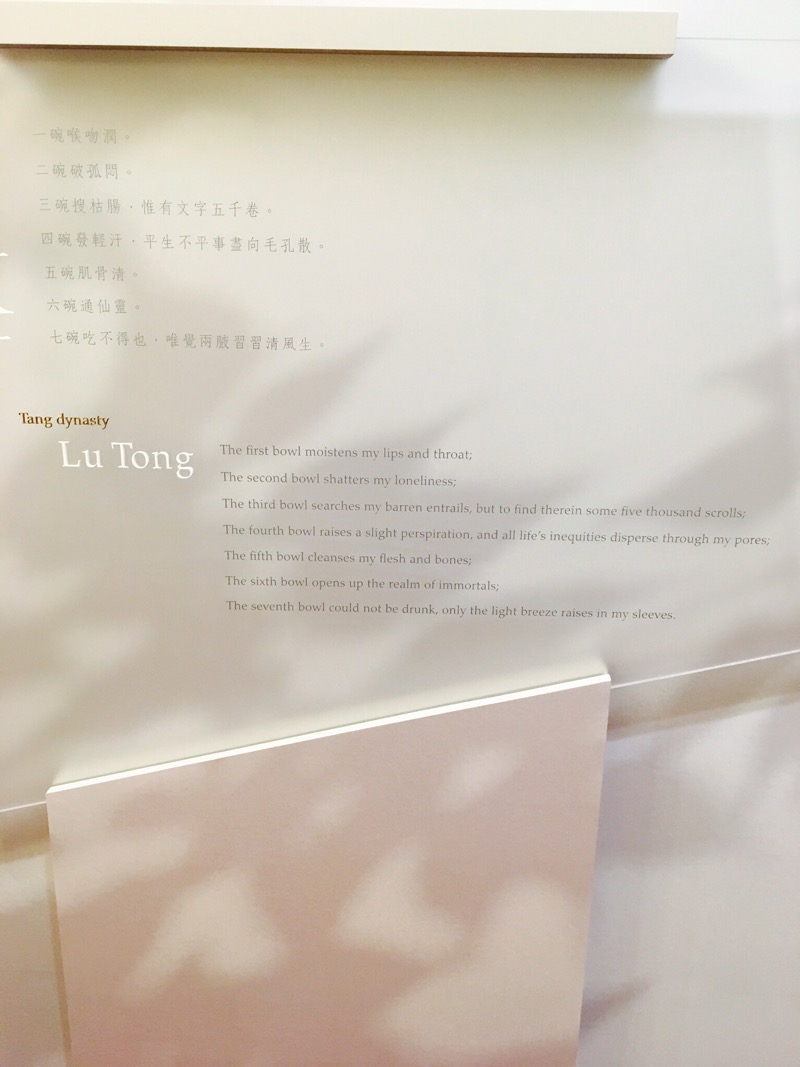
A Dinastia Tang também ficou marcada pelo poeta Lu Tong (ou Yuchuanzi) que dedicou a sua vida a estudar a cultura do chá. Nascido em 790 na cidade de Jiyuan, viveu em reclusão na montanha de Shaoshi durante a sua juventude. Entretanto, caiu nas boas graças de Han Yu, poeta que teve um papel fundamental no neo-confucionismo, e mudou-se para Luoyang.
No dia 20 de novembro do ano de 835, estava hospedado na casa do primeiro ministro Wang Ya quando se deu o “incidente Ganlu” que vitimou ambos.
Este incidente corresponde à tentativa do extermínio dos eunucos que ocupavam cargos elevados na corte, nomeadamente entre os conselheiros do imperador, e que estimularam intrigas políticas. Ainda assim, o resultado não foi o esperado e os eunucos sobreviventes acabaram por ganhar ainda mais poder.
A poesia de Lu Tong tem um estilo muito próprio que, por isso, o define e o poema que motiva aqui a sua referência é precisamente o intitulado “Sete Taças de Chá“. O poema está transcrito numa das paredes do museu de chá de Hong Kong, que se vê na fotografia, da autoria de Tachos&Porcelanas que recentemente visitou esse museu.
O poema:
Sete Taças de Chá
“A primeira taça humedece meus lábios e garganta;
A segunda taça quebra minha solidão;
A terceira taça procura as minhas estéreis entranhas, mas para ali encontrar cerca de cinco mil pergaminhos;
A quarta taça levanta uma ligeira transpiração e todas as iniquidades da vida se dispersam pelos meus poros;
A quinta taça limpa a minha carne e ossos;
A sexta taça abre o reino dos imortais;
A sétima taça não poderia ser bebida, só a leve brisa sobe nas minhas mangas”.
In English
The Tang Dynasty was also marked by the poet Lu Tong (or Yuchuanzi) who dedicated his life to studying tea culture. Born in 790 in the city of Jiyuan, he lived in seclusion on Shaoshi Mountain during his youth. However he met Han Yu, a poet who played a key role in neo-Confucianism, and moved to Luoyang.
On November 20 of the year 835, he was staying at the home of Prime Minister Wang Ya when the Ganlu incident occurred in which they both were killed.
This incident corresponds to the attempted extermination of the eunuchs who occupied high positions in the court, among the emperor advisers and that originated several political intrigues. Still, the result was not as expected and the surviving eunuchs eventually gained even more power.
The poetry of Lu Tong has a very own style and the poem that motivates his reference here has precisely the title “Seven Tea Bowls“. The poem is transcribed on one of the walls of the Hong Kong tea museum, shown in the photograph by Tachos&Porcelanas, who recently visited the museum.
The poem:
Seven Tea Bowls
“The first bowl moistens my lips and throat;
The second bowl shatters my loneliness;
The third bowl searches my barren entrails but to find therein some five thousand scrolls;
The fourth bowl raises a slight perspiration and all life’s inequities disperse through my pores;
The fifth bowl cleanses my flesh and bones;
The sixth bowl opens up the realm of immortals;
The seventh bowl could not be drunk, only the light breeze raises in my sleeves”.
